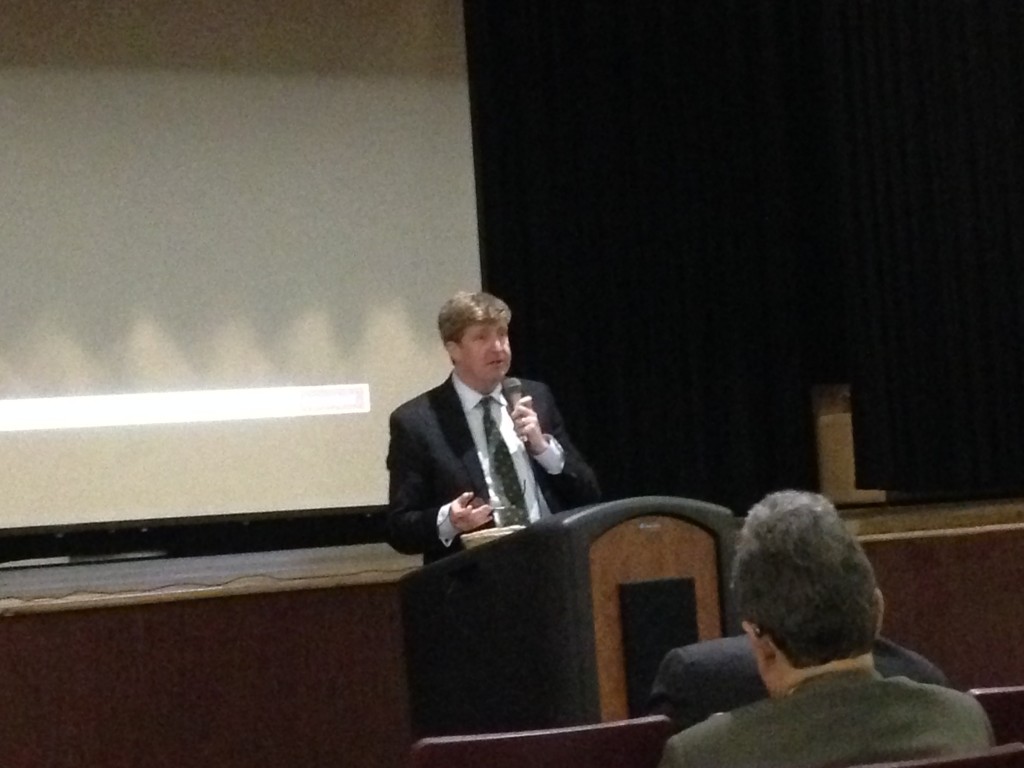Marijuana legalization is being driven by special interests in hopes of opening a multi billion-dollar market and could lead to more widespread drug use and higher rates of addiction as the drug is more potent than ever before, Brick residents were told Wednesday night at a seminar which featured former U.S. Rep. Patrick Kennedy and local law enforcement officials.
The seminar held at Brick Township High School, titled “Let’s Be Blunt: A Conversation About Marijuana,” brought into question the movement to legalize the substance and represented a slight pivot from the more prominent discussions on heroin addiction in Ocean County.
Brick Township High School Principal Dennis Filippone kicked off the discussion with one of the scenarios that disturbs him most as a school official: the reaction of some parents after he has to call home to tell them about their child’s positive drug test.
|
|
“One of the most disturbing responses that I get is, ‘thank God it’s only marijuana,'” he said.
In an era where the Jersey Shore’s heroin epidemic makes more headlines, the subject of marijuana use has fallen to the wayside, in many respects.
“Nobody really addresses it anymore,” said Donna DeStefano, the regional coalition project director for Prevention First, an anti-drug organization. “Nobody’s talking about it.”
Those who are talking about it, other officials said at the presentation, are often arguing that the drug should be legalized, which they say brings a host of related issues that could have a harmful effect on young people. Today’s marijuana is far different than what many people experienced growing up during the days of sex, drugs and rock and roll in the 1960s and the anti-war era of the 1970s.
“Average potency now is about 20 percent,” said Christopher Gramiccioni, acting Monmouth County Prosecutor, compared to 1 to 3 percent potency during the 1970s.
“Growers are getting better at what they’re doing, and it’s getting more potent,” said Gramiccioni. “At the end of the day, that euphoric feeling that people get when they use marijuana, it causes people to seek out another substance that will give them a greater fix or a greater high when [marijuana] just isn’t cutting it.”
So-called “earwax marijuana,” he said, has potency levels of about 90 percent. That blend of the drug is now commonly used in vaporizers most often associated with e-cigarettes.
Ocean County Prosecutor Joseph Coronato also addressed the Brick audience, speaking about the risks of legalizing marijuana, and the myriad questions of how its legality will affect society. How will workers in sensitive occupations such as school bus drivers, pilots, physicians or police officers – who deal in potentially life and death situations – be handled if getting high is a legal right.
“Are we going to legalize something without any kind of standard?” Coronato asked.
But it was former U.S. Rep. Patrick Kennedy (D-R.I.) who came out most strongly against marijuana legalization, chronicling years of his own battles with addiction and putting forth a case that it is the prospect of billions of dollars in potential profits that is behind the immense lobbying push to legalize pot.
“If we’ve seen anything from what tobacco did to our country, where they marketed themselves as health products originally, and then said, ‘oh no, we’re not targeting kids,’ then … we had a big settlement because we found out they were lying to the American public for 50 years,” he said, “The worry is that if you legalize marijuana, you’re giving the ability to corporations to market marijuana. Who will their market be? People like me, people who have a disorder.”
“They’re in the addiction business,” said Kennedy, of businesses ranging from the heirs of reggae singer Bob Marley, who this week introduced the nation’s first name-brand marijuana, to rappers such as Snoop Dogg and 2 Chainz, who are selling their own brands of vaporizers.
“I’m looking back at the anxiety I had as a teenager, and I’d want anything that could relieve that anxiety,” said Kennedy, predicting that just like tobacco companies which targeted young people with figures such as Joe Camel, marijuana sellers would look toward teens as their prime market.
“What the drug is, is less important than why you’re using it and what you’re using it for,” said Kennedy, who told the audience at the BTHS auditorium that he has been sober for three years and seven months. “Those of us who are in recovery know how tough it is to have even a couple of days strung together. The biggest victory for me is that I’ve been able to put some time together. One day at a time is so true.”
Dr. Kevin Sabet, an assistant professor of psychiatry, and director of the Drug Policy Institute at the University of Florida, also spoke, reiterating the argument that marijuana legalization comes down to one main factor: money.
“This is about people, frankly, who look like me, wearings suits with the Yale M.B.A.s, figuring out how to break into the billion dollar industry which is pot,” he said.

Advertisement

Police, Fire & Courts
Grand Jury Indicts Point Pleasant Man, Once a Fugitive, for Attempted Murder









